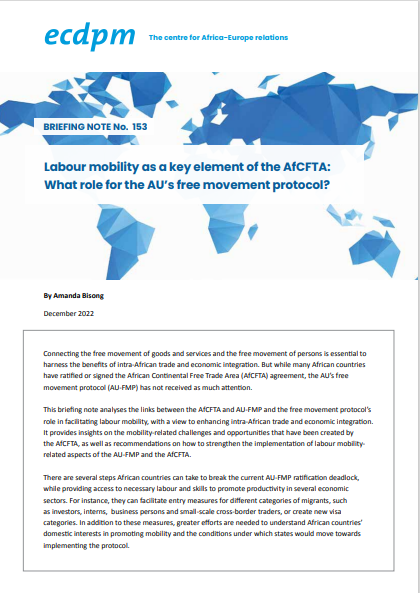Labour mobility as a key element of the AfCFTA: What role for the AU’s free movement protocol?

Connecting the free movement of goods and services and the free movement of persons is essential to harness the benefits of intra-African trade and economic integration. But while many African countries have ratified or signed the African Continental Free Trade Area (AfCFTA) agreement, the AU’s free movement protocol (AU-FMP) has not received as much attention.
This briefing note analyses the links between the AfCFTA and AU-FMP and the free movement protocol’s role in facilitating labour mobility, with a view to enhancing intra-African trade and economic integration. It provides insights on the mobility-related challenges and opportunities that have been created by the AfCFTA, as well as recommendations on how to strengthen the implementation of labour mobility related aspects of the AU-FMP and the AfCFTA.
There are several steps African countries can take to break the current AU-FMP ratification deadlock, while providing access to necessary labour and skills to promote productivity in several economic sectors. For instance, they can facilitate entry measures for different categories of migrants, such as investors, interns, business persons and small-scale cross-border traders, or create new visa categories. In addition to these measures, greater efforts are needed to understand African countries’ domestic interests in promoting mobility and the conditions under which states would move towards implementing the protocol.
Download:https://www.pacci.org/wp-content/uploads/2023/01/ECDPM_Labour_Mobility_as_a_Key_Element_of_the_AfCFTA_Role_of_the.pdf

 Africa News
Africa News